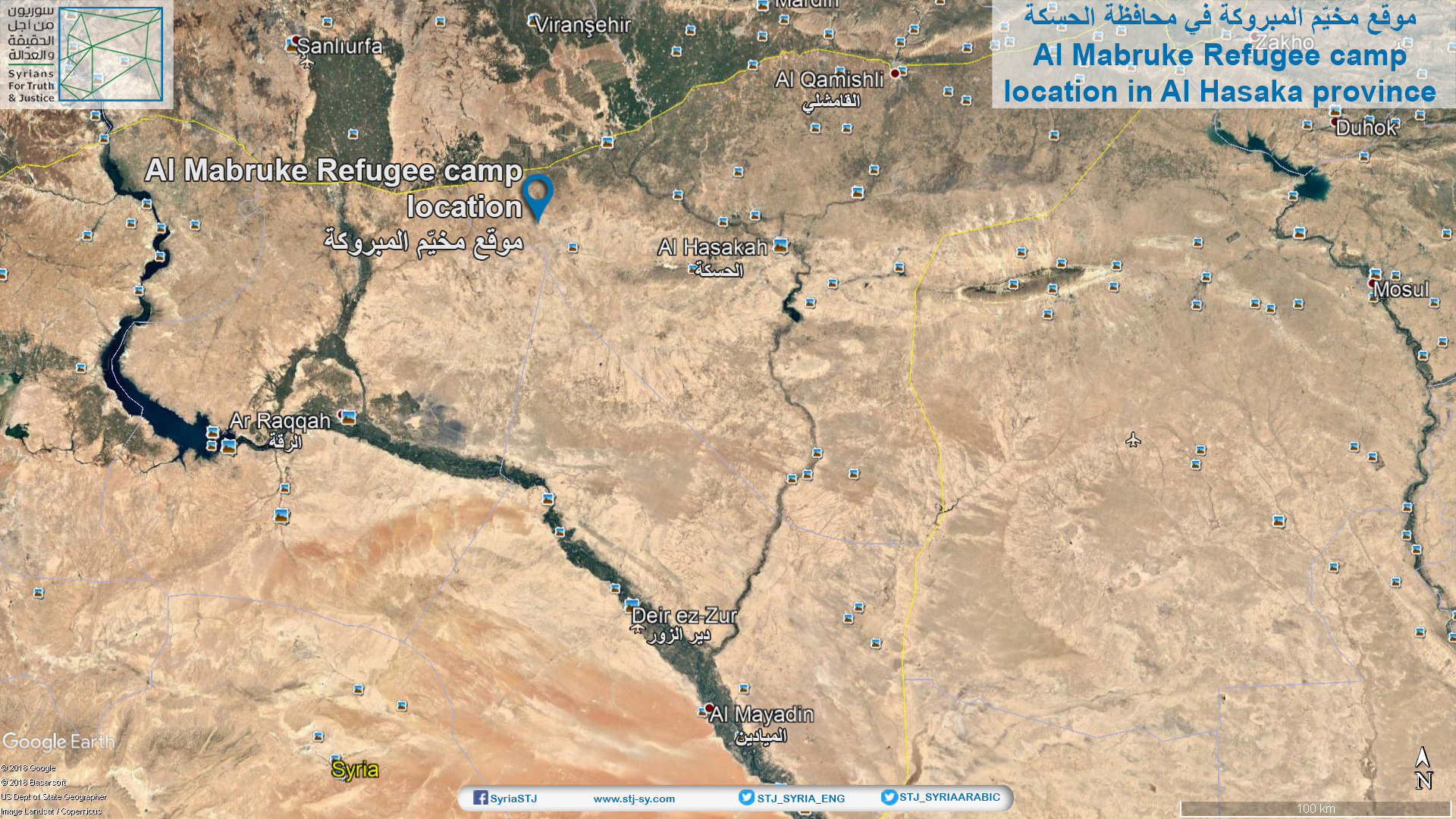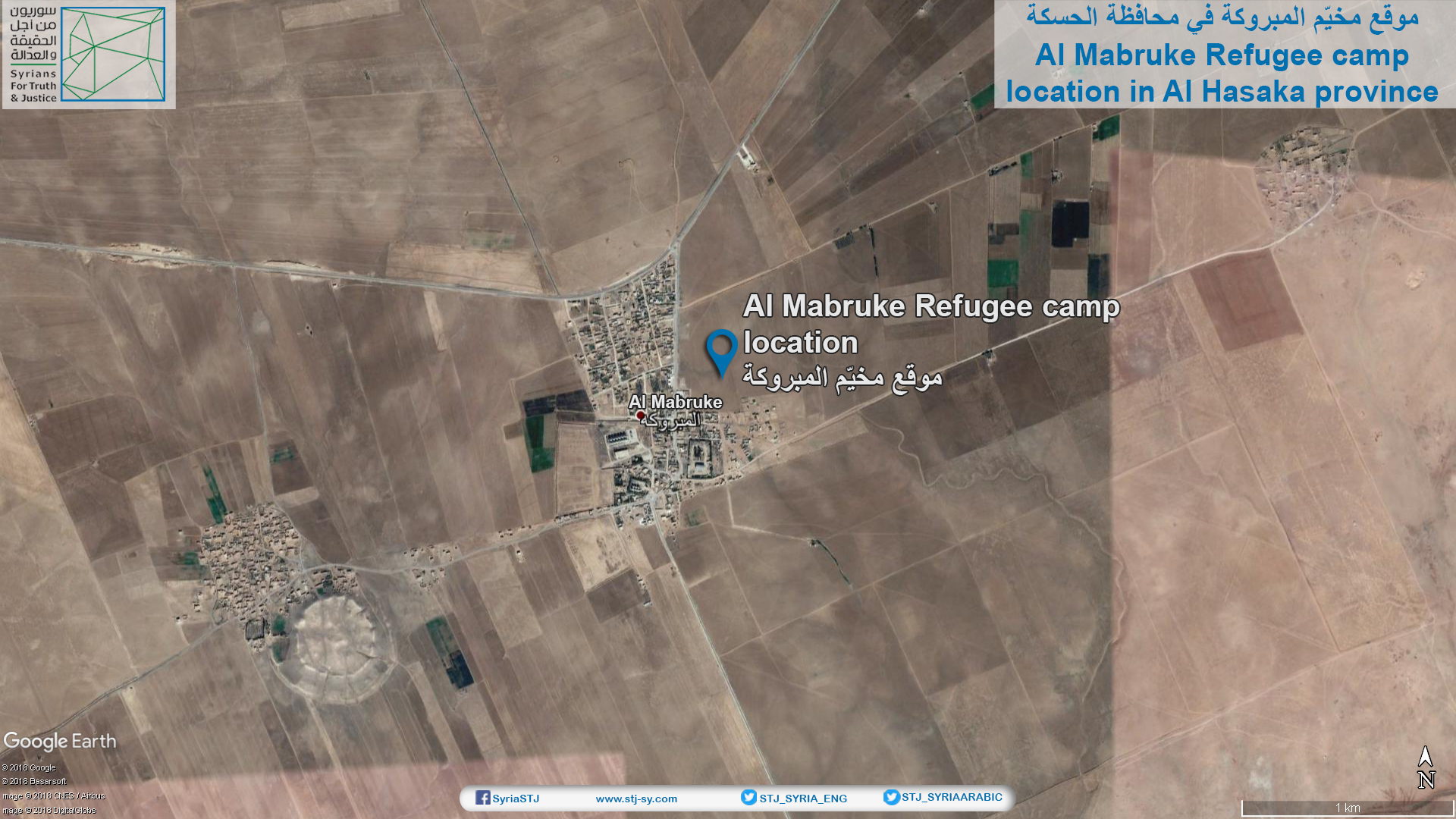Preface: Acute food poisoning killed a child and hit eight others in Mabrouka camp, west of Ras al-Ayn/ Sari Kani City, during May 2018. Several children with food poisoning were transferred to the only medical center in the Camp on May 22, 2018, only days after the distribution of food aid baskets to the residents, according to several eyewitnesses and testimonies obtained by STJ. Those baskets, which an International Relief Organization called "Handicap" distributed them to the residents of the camp, contained expired food cans, according to a private source from the camp administration.
According to STJ field researcher, panic and fear spread among the residents of the camp, after a number of children got food poisoning. While the medical staff working inside the camp got worried because of the severe infections they received and the lack of the center readiness to treat such cases, adding that the camp administration carried out an immediate investigation into the incident
Mabrouka Camp had earlier witnessed the death of three children during December 2017, as a result of the bitter cold and lack of medical services. STJ prepared a detailed report on this incident entitled "Cold and Shortage of Medical Services Cause Death of Three Children in Mabrouka Camp, The Camp Contains Up To 8,000 Displaced from Deir az-Zor and Raqqa
It was not only Mabrouka Camp in which deaths were recorded, al-Hawl Camp, east of Al-Hasakah city, also witnessed 24 deaths during March 2018, following the wide outbreak of the deadly disease of typhoid in the camp. STJ prepared a report on this incident, entitled "Deaths in al-Hawl Refugee Camp after the Outbreak of Typhoid, By the Beginning of April 2018, 24 Deaths of Typhoid were Recorded in the Camp, mostly Women and Children, Besides 269 Infections. "
STJ had also prepared a Fact Sheet on Camps for “the Internally Displaced” Located in Autonomous-Administered Areas in Northern Syria. It is a background paper on the camps located in the areas under The Syrian Democratic Forces/ SDF/QSD.
First: Where is Mabrouka camp located and who resides in it?
When clashes and battles broke out between Syrian regular forces on the one hand and ISIL agents on the other, specifically in the countryside of Deir ez-Zor and Ar Raqqah in 2015, many people in those areas fled to the countryside of al-Hasakah province, which is under the control of Autonomous Administration, from the south and the south-west sides. Where internally displaced persons/ IDPs flocked to the territory of the al-Hasakah countryside, but their numbers were initially low,
Autonomous Administration relocated IDPs to al-Hasakah city or to al-Hawl Camp, which was prepared at the time. However, the upsurge in fighting between the parties in 2016, led to the influx of people towards al-Hasakah province following which the Autonomous Administration began rehabilitating an agricultural land, which is located 40 km west of Ras al-Ayn/Sari Kani City, and it managed to establish Mabrouka Camp on it to reside IDPs there, on January 28, 2016.
Some 4,600 people are living in the camp, who were displaced from Deir ez-Zor and Ar Raqqah, according to the camp administration statistics as at May 24, 2018.


A satellite image shows the approximate location of Mabrouka Camp.
Second: Poisoning incidents following the distribution of expired foodstuffs
A relief organization called "Handicap" distributed food aid to IDPs in the camp on 16 and 20 May 2018, most of that aid was canned food. "Abu Muhammad", alias, a displaced from Deir ez-Zor to Mabrouka Camp in early 2018 spoke to STJ saying:
"Most of the aid distributed to us was food cans which contained (chicken, fish, cheese, beans and chickpeas). Each family of seven members or less got an aid basket containing about 23 cans, while families with more than seven members, got two aid baskets. I have noticed that the food cans were locally produced that the manufacturer label was still on the cans, they hadn’t removed it as other organizations usually do to not promote any food companies, noting that the organization has distributed food aid to all residents of the camp.”
Abu Muhammad added that three children with acute food poisoning had flocked to the medical center, supervised by the Camp administration, on May 22, 2018, and were placed under medical supervision for 24 hours. In less than one day, seven more children, as young as seven, came to the medical center, with severe vomiting and they were diagnosed with food poisoning, but a 4-year old child had died one day after being placed under intensive care, without knowing the cause of his death, on 24 May 2018.
A staff member at the medical center of the camp told STJ that they were shocked by the seriousness of the infections they received, without any warning, and this connection he goes on to say:
“In two days, 9 children with severe vomiting were transferred to the center and been placed under intensive care. We made them partial gastric lavage, along with injecting them serums. However, one of those children, named Luay Haytham, 4 years old, had died because his body didn’t handle poisoning and severe vomiting, which resulted to dehydration and subsequently to death. After the death of Luay, five other seriously infected children were transferred to the hospitals of Ras al-Ayn, close to Mabrouka Camp to get treatment. Parents of most of those children assured that their children had eaten food cans contents with bread and drank water only. So the medical team checked the water tanks near these families’ place of residence, but it was clean, so the aid baskets and the food cans they contain were the only left stuffs to check, thus a request had been made to the camp administration to consider the issue.”
The medical source added that the camp administration, along with some UNHCR coordinators, had examined food cans that have recently been distributed, and they found that there were expired cans for more than a month, especially chicken cans and some legumes’, which necessitated the immediate formation of a team to remove all of the food cans from the camp, noting that the IDPs had not yet been compensated with any other aid and the issue had not even been considered.
STJ had also got another testimony from a resident of the camp, who is a parent of two children infected with food poisoning, he said that they noticed that there was some water inside one of the food cans, but they didn't care about it and continued:
“We hadn't give it any importance, since our hot weather can spoil the food, until one of my neighbors told me that he threw some cans because they have no expiration date, and he also noticed the white water inside the can. When I read the expiration date on a chicken can, I was shocked that the expiration date was April 1, 2017, but I was too late, where my two children had eaten one, and in the morning they were hit by a severe vomiting, we waited a while that they would get better but they didn't, so we took them to the only medical center in the camp, where we saw four other children suffering the same symptoms my children had. However, my children responded to the treatment and started to recover, thank God. Two days after the incident, the camp administration confiscated all of these food cans and we were not compensated, since this basket was our meal for Ramadan.”
A private source from the camp administration told STJ, that the administration has examined most of the food cans, especially those containing chicken, and found that they was expired since late 2017. Noting that the administration had allowed "Handicap" organization, to distribute aid without being examined first, because it is a foreign and well-known organization, and had a specific protocol and oversight committees, which give no right to the Camp administratio to examine aid, and he goes on to say:
"We have opened an investigation into the case, and we have asked the organization to attend meetings inside the camp with the participation of the Asayish Forces, as well as a Committee from UNHCR, in order to reconsider what had happened, and also we will try to compensate the IDPs affected, especially the families of the child who had lost his life as a result of food poisoning.”

